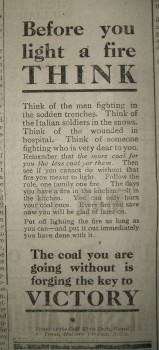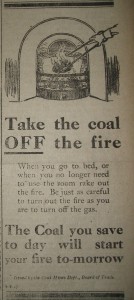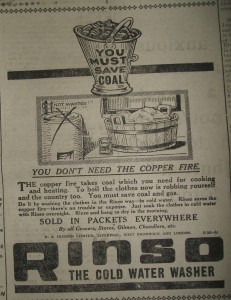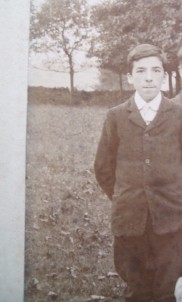Quite apart from the ‘flu outbreak, domestic life was not easy after four years of war. The coal shortage caused by the draft into the military of miners and the commandeering of fuel for military purposes was causing anxiety, as winter approached. The local press carried a variety of adverts on the subject, ranging from the patriotic angle (“Think of the men fighting in the trenches…”), to the more practical public service-type announcement (“The Coal you save to day will start your fire tomorrow”) and the rather opportunist commercial angle (courtesy of Rinso: “You don’t need the copper fire”).
There had been a heated argument about the proposed rise in milk prices from 7d to 9d per quart – in the end, after weeks of criticism from one side and justification on the other, the compromise of 8d was arrived at.
Australian airmen had put on one of their shows at the Primrose League Hall (in Halliday’s Mill): an evening in which ‘mirth and merriment was the presiding genius’ – a welcome escape from everyday anxieties. The performance raised £9 10/- for the Wesleyan Church.
There was some good news about some local servicemen. George Humphries, from Bussage had been awarded the Military Medal ‘for gallantry on the battlefields of France’:
His mother received the news last week but George gives no particulars, only saying it was by hard fighting. A few weeks ago the gallant soldier was home on 14 days’ leave after 13 months in France, and two days after he returned to duties he won the distinction referred to. He is only 21 years old. Needless to say, his mother, sisters and friends are very proud of him, and hope that he will be spared to return safely to his home once more.
Douglas Webster, son of Frank Webster, fighting with the Canadian forces had gained the Military Cross ‘for operations in August this year’. According to the London Gazette in an article published on 29th November, it was awarded:
…for conspicuous gallantry and initiative during an attack. He was in support company, but, observing that the attack was being held up, he at once went and secured a Tank, guide it to the front affected, and then led his platoon forward to the support of the troops in front, breaking the enemy’s resistance and enabling the advance to continue. Later when his company took the offensive, he skillfully led his platoon round the flank of a large force of the enemy, and brought effective fire to bear; enabling his company to kill or capture the garrison.
Bert Smart of Chalford had been wounded in the knee, and was currently in Warrington hospital. He had ‘seen much hard fighting this last twelve months and was on the St Quentin’s front. He was wounded only a fortnight after his chum, Ray Scarsbrook, of Brimscombe, met his fatal blow’.
There was development of the VD story. “The spread of this disease has increased so greatly, and the effect on the whole country is so serious”, explained the Journal, that a series of lectures was being held at places of work – separate sessions for men and women. There was also a clinic held at Stroud hospital, 6pm on Tuesdays for men, 6pm on Thursdays for women (there was a female doctor, Mary Davie), ‘under conditions of strict secrecy’.
The Chalford Soldiers’ and Sailors’ Parcel Fund had presented its annual accounts (audited by Frank Webster). Between 31st March 1917 and 31st March 1918, receipts had totalled £180 3/7, while expenditure had been £171 8/8 – leaving a balance of £8 14/11 which was augmented by proceeds of whist drives and dances. The committee were already busy with the Christmas parcels for 1918 – ‘those for Mesopotamia, India and Egypt have already gone…’ Ten local men were POWs in Germany and Austria.
On 1st November, the Stroud News reported that new ration books were to be issued the following Sunday, and that jam would be included in the list of controlled foodstuffs. The paper also carried the following reflection on the late autumn landscape:
It is the season of changing tints and shades, when the wooded hills – which, alas, have already paid paid heavy tribute to the demands of war – are seen in all their glory from the sheltered valleys.





